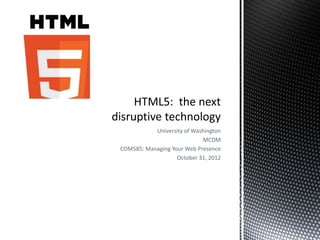HTML5: The next disruptive technology
- 1. University of Washington MCDM COM585: Managing Your Web Presence October 31, 2012
- 2. ’é¦ HTML5 is the latest version of HTML (defined as an application of Standard Generalized Markup Language) and XHTML (XML markup languages that mirror extended versions of HTML; an application of XML) ’é¦ 5th version of HyperText Markup Language ’é¦ Not based on SGML (Standard Generalized Markup Language), but must be backwards compatible ’é¦ Introduces new APIs, specific scripting that can be used with JavaScript (drag and drop, x-doc messaging) ’é¦ HTML5 is still in development, wonŌĆÖt be finished for a few years (2014 recommendation for HTML5.0) ’é¦ The core goal is to improve the language with support for the latest multimedia while keeping it easily readable by humans , computers and devices ’é¦ Adds new features: video, audio, canvas, SVG session storage, localStorage, geolocation ’é¦ Net result: more happens within the browser and locally on computers or devices, net: enables everything to happen more quickly, consistently, and efficiently ’é¦ Most mean HTML, CSS and JavaScript
- 3. ’é¦ HTML4 recommended by W3C (Web Consortium) in 1997 ’é¦ Considered a rough guide on many of the core features of HTML ŌĆō but does not go far enough ’é¦ HTML5 was started in 2004 by the WHATWG (Web Hypertext Application Technology Working Group) ’é¦ Defines a single language called HTML that can be written in HTML syntax and XML syntac ’é¦ Defines detailed processing models to foster interoperable implementations ’é¦ Improves markup for documents ’é¦ Introduces markup and APIs for emerging idioms such as Web applications
- 4. ’é¦ Its not 1 big thing ’é¦ Includes the Mobile Web ’é¦ Native ’é¦ Mobile Web ’é¦ Hybrid ’é¦ Apps ’é¦ Instagram = native mobile app ’é¦ LinkedIn & Facebook = hybrid ’é¦ Tumblr = hybrid, mostly html5 ’é¦ Financial Times ŌĆō html5 ’é¦ Kindle Cloud reader
- 5. ’é¦ Infographic: HTML vs Flash ’é¦ Gaming industry pro Flash; New developers pro HTML5 ’é¦ Greater browser support for Flash (99%), but HTML5 (50%)is growing ŌĆō making consistent headway in adoption rates (IOS/Android 8%) ’é¦ Apple has embraced HTML5 as an open source web technology for OS and web-enabled devices ’é¦ Ongoing ’é¦ HTML and Hybrid are young and evolving; mobile browsers are rapidly improving
- 6. ’é¦ Distribution ’é¦ Native apps are distributed via app stores, controlled by the owners of the platforms ’é¦ HTML5 distributed via the rules of the open web, the link economy ’é¦ Monetization ’é¦ Native apps come with one-click purchase options built into mobile platforms ’é¦ HTML5 will be monetized via advertising because payments will be less user- friendly ’é¦ Platform power and network effects ’é¦ Developers have to conform with AppleŌĆÖs rules ’é¦ Developers can cut Apple out of the loop with HTML5 reducing AppleŌĆÖs platform ’é¦ Functionality ’é¦ Now, native apps do more than HTML5 apps ’é¦ HTML5 apps will get better
- 7. ’é¦ Most popular types of apps will be early adopters ’é¦ HTML5 is useful for media apps and access apps . Apps that display text, images and video and monetize via ads and subscriptions can be done more cheaply and effectively via HTML5 ’é¦ Increasing prevalence of ŌĆ£shell appsŌĆØ (hyprid) will push things along ’é¦ HTML5 will improve, will be cheaper to produce = disrupter ’é¦ HTML5 comes from WC3 ŌĆō which means the technology will evolve slowly
- 8. ’é¦ What is HTML5? http://en.wikipedia.org/wiki/HTML5 ’é¦ Differences from HTML4 http://dev.w3.org/html5/html4- differences/ ’é¦ Controversy http://www.pearltrees.com/#/N-u=1_844&N- p=5756620&N-s=1_679015&N-f=1_679015&N-fa=9820 ’é¦ Debate http://www.techrepublic.com/blog/webmaster/html5-vs-flash-the-state-of- the-debate/1556 ’é¦ Infographic http://venturebeat.files.wordpress.com/2012/01/html5vsflash3- e1328040556991.jpeg ’é¦ Ongoing http://blog.apigee.com/detail/html5_the_apps_the_frameworks _the_controversy_video_slides ’é¦ The next disruptive technology http://www.adobe.com/inspire/2012/02/html5-next-disruptive- technology.html ’é¦ The debate matters http://www.businessinsider.com/html5- vs-apps-why-the-debate-matters-and-who-will-win-2012-10








